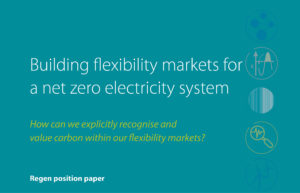
Our policy and advocacy manager, Madeleine Greenhalgh, explores how carbon is measured and valued in flexibility markets

Our policy and advocacy manager, Madeleine Greenhalgh, explores how carbon is measured and valued in flexibility markets
 Over the past year, Regen and the Electricity Storage Network have been exploring the question of carbon in flexibility markets, working with National Grid ESO, Ofgem and BEIS to improve the sector’s approach to this issue. We have written a short position paper which outlines our key recommendations and we ask for your input into this debate.
Over the past year, Regen and the Electricity Storage Network have been exploring the question of carbon in flexibility markets, working with National Grid ESO, Ofgem and BEIS to improve the sector’s approach to this issue. We have written a short position paper which outlines our key recommendations and we ask for your input into this debate.
We know flexibility is essential for a net zero system, and the UK has made great strides over the last few years to improve flexibility to adapt to increasing renewable generation. However, whilst some low carbon technologies have started to make inroads into flexibility markets, they are largely provided by incumbent fossil fuel generation.
If we are to transition to a net zero grid, our flexibility services also need to be net zero carbon. We need to send the right signals through energy markets to incentivise those low carbon assets and begin that transition in earnest.
An effective carbon price is often seen as the solution to achieving this, but this is unlikely to be a full solution for flexibility:
We are therefore asking that:
Regen and the Electricity Storage Network are working closely with National Grid ESO and BEIS to understand the barriers to achieving these aims and to help develop the policy direction. Other issues that require further development include; exploring the legal and economic implications of the market mechanisms suggested; the role of renewables in providing flexibility; and the additional benefits of opening up carbon intensity data.
We have seen broad industry support for implementing measures that increase the cost of carbon, although there is still a divide between the desire for an effective economy-wide carbon price and the need for additional market intervention.
BEIS are currently conducting a bold programme of work on this subject and we ask that industry engage with this debate and help move us forward to quick action, whatever the solution.
If you would like to help us develop this work further, please do get in contact. Alternatively, please engage with BEIS’s policy work on this issue as they update the Smart Systems and Flexibility Plan.